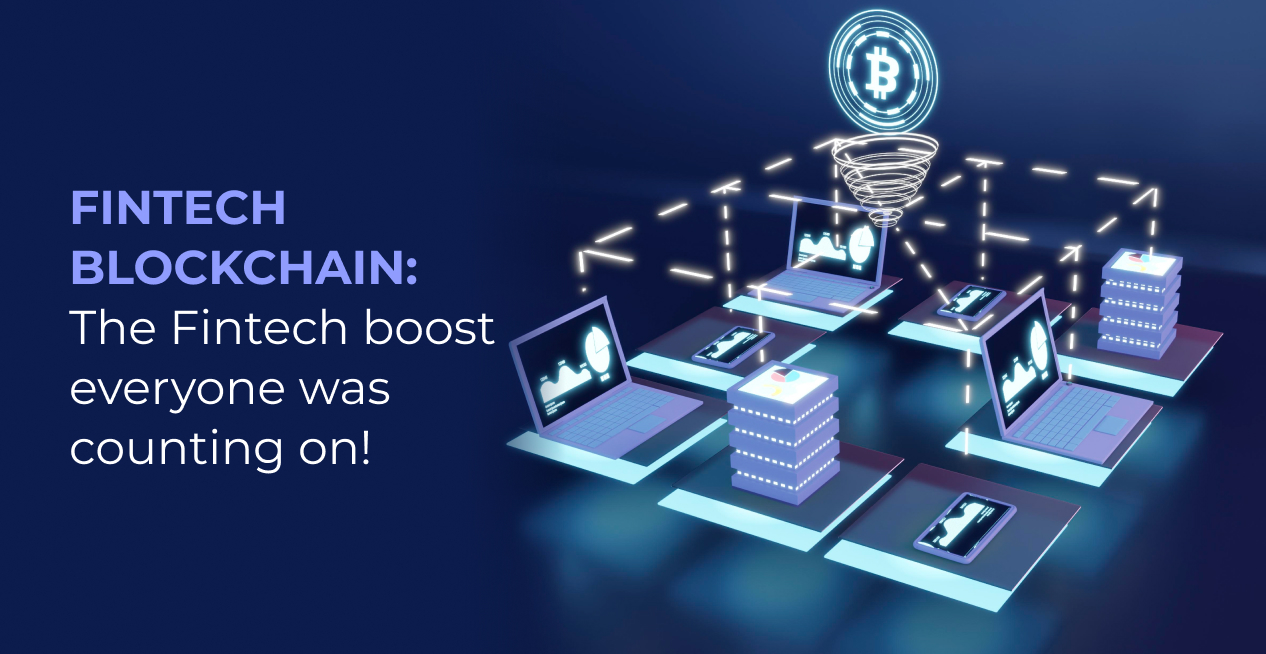-
What is Fintech?
- Popular Blockchain Trends
-
Understanding Blockchain in FinTech and its Benefits
- Low operational costs and fewer fees
- Flexible service availability
- Security
- Automated processes
- Better visibility and reach
- Data congruence
- Challenges in the Fintech Industry that Blockchain Addresses
- Ways Blockchain is Revamping the Fintech Industry
- Speed: A Fintech Product Developed by OpenXcell
- Blockchain in Fintech : Closing Thoughts
The fintech industry is the latest addition to the group of industries that seem to be realizing the transformative potential of Blockchain. Blockchain technology is known for the host of benefits that it brings to the table such as redesigned user experience, software delivery workflows, and reducing risks in business. The Fintech industry is making the best of these benefits by employing them within their applications and BFSI Software solutions (Banking, financial services, and insurance). Before we venture into the ways blockchain is reinventing fintech, let us first have a look at what all entails in a Fintech application.
What is Fintech?
Fintech is a portmanteau word made of two words – Finance and Technology. As intended the word refers to finance industries that are digitally transforming themselves by employing the best of technology available in the market. The latest technology that is being incorporated in fintech industries is Blockchain. Blockchain technology is a distributed ledger technology based on a decentralized principle. This means that control or access to the records is not with a single entity but rather distributed amongst different nodes on a blockchain network.
Since every block of data is immutable, the need for third parties interference also reduces by leaps and bounds. Fintech has the largest market share in the blockchain market and rightly so. It will be valued at a whopping $ 36.04 billion by the end of 2028. This is clear evidence that Fintech and blockchain have a lot of potential when it comes to its adoption in mainstream markets. Some of the ways blockchain technology trends are being incorporated into the industry are as follows:
Popular Blockchain Trends
Cryptocurrencies
Bitcoin was first introduced in 2009 as the first cryptocurrency as an alternative form of payment and was created using encryption algorithms. It acts as a digital currency and is stored in cryptocurrency wallets which also double up as virtual accounting nodes.
Decentralized applications(Defi)
Decentralized finance (DeFi) is yet another financial technology-based application that runs on secure distributed ledgers just like cryptocurrencies. Defi applications challenge traditional banking institutions including banks and brokerages. Defi challenges this centralized financial system with peer-to-peer transactions without the need for any middlemen. Also, the fees that banks and other financial institutions charge for their services are eliminated. Anyone with an internet connection can use DeFi apps via which users can store money in a safe digital wallet and transfer money quickly.
Non Fungible Tokens(NFTs)
NFTs, or non-fungible tokens, are blockchain-based tokens that individually stand for a distinct asset, such as a work of art, digital material, or information. For any given item, digital or real, an NFT may be viewed as an irreversible digital proof of ownership and authenticity.
Smart Contracts
Simply put, smart contracts are blockchain-based programs that execute in response to preset triggers. Generally, they are employed to automate the implementation of an agreement so that there is no need for an intermediary and no delay for any parties involved in knowing the conclusion right away. Additionally, they can automate a workflow such that it only moves forward when certain criteria are satisfied.
Understanding Blockchain in FinTech and its Benefits
Needless to say, 2024 has been the era of Fintech as more and more fintech software development company thrive in new-age tech markets. These companies have been extremely successful and have been client favorites for a variety of reasons. Let us have a look at the benefits it seems to offer to consumers and businesses investing in them:
Low operational costs and fewer fees
As mentioned earlier, Blockchain in finance markets eliminates the need for banks and middlemen. They significantly reduce transaction costs along with lowering the number of intermediaries involved. For example, a simple credit card transaction involves a merchant, a bank, and a credit card network each levying a fee for their services. Cross-border payments including foreign exchange further increase the number of channels charging their fee. However, Blockchain-backed digital transactions often employ a user and sometimes tech support for the same which results in convenient, secure, and immutable transactions.
Flexible service availability
Banking services can get disrupted due to various factors which causes ultimate inconvenience to the consumer. These factors can be attributed to regulatory limitations or inadequate technological skill sets or infrastructure. Leveraging blockchain by fintech is often the most efficient way to operate without these constraints and limitations.
Blockchain elements such as decentralized applications, smart contracts, and wallets allow a certain level of flexibility to its users when compared to traditional banking models.
With the help of these elements, clients may conduct transactions at any time and from any location in the globe thanks to decentralized apps, cryptocurrencies, and smart contracts. Put differently, financial services can be accessed worldwide at all times.
Security
The three most important attributes of blockchain often guarantee maximum security to a transaction. These are:
- Decentralization
- Encryption
- Immutability
These three attributes provide the ultimate security to any business transaction, data, and records.
Automated processes
Workflows when automated with blockchain technology have been proven to be more reliable and efficient compared to their manual counterparts. They not only deliver efficiency but also perform tasks with more accuracy than a human.
Better visibility and reach
Another notable benefit of blockchain technology in a fintech market is the visibility and reach it provides to its customers. Especially for users entering financial institutions, stringent bank account regulations and complicated legislation can be a deterrent. However, blockchain-led financial platforms are much more convenient and eliminate these deterrents.
Data congruence
As highlighted earlier, data congruence is one of the benefits of blockchain-led fintech platforms. Strict protocols and smart contracts are one way to ensure data is secure from mutability and complies with regulatory requirements.
Challenges in the Fintech Industry that Blockchain Addresses
Dependency on a singular centralized authority
In conventional systems, the transactions and data information lie with a centralized entity which the user has to approach for access to their data. Blockchain addresses this by giving more autonomy to the user and keeping the information on multiple nodes as a distributed ledger.
No trustability
The existing Fintech applications lack trustability as they are more susceptible to identity thefts and data mutability. Blockchain-led fintech applications resolve this concern with their transparency and steadfastness in securing transactions.
Slow processes
While traditional financial processes can take anywhere from a few days to several weeks, blockchain is designed to bring in speed. It seamlessly handles transactions while reducing a transaction’s speed to mere minutes.
Higher operational costs
Fintech systems that do not run on blockchain have notably higher operational costs and more manpower requirements. Smart contracts on the other hand reduce these requirements by a fourth and can rake up higher revenues by the reliability and trust factors for consumers.
Ways Blockchain is Revamping the Fintech Industry
Here are a few key areas in which blockchain is actively reinventing the fintech industry.
Banking and P2P payments
The need for conventional banking setups is declining and blockchain-led fintech is ensuring just that. According to Accenture, blockchain can help save up to 10 billion dollars for investment banks across the world. Cryptocurrencies as an alternative way of payments are already making it to mainstream markets. Elon Musk’s recent acceptance of Bitcoin payments for Tesla cars was a landmark in blockchain integration in P2P blockchain banking aspects. Many other cryptocurrency applications are cropping up as alternative currencies globally and are changing banking as we know it.
| Bonus Read: P2P Lending Apps
Digital identity protection
While banks do have stringent KYC and AML procedures, they are not infallible. Blockchain technology also provides a system of digital identification in which, after completing validation once, the customers can use it to conduct transactions anywhere in the world. Blockchain can benefit financial users in controlling identity information exchange, minimizing security vulnerabilities in data, and digital ledger keeping of transactions.
Trading and trade finance
Trade finance still relies on documentation for verification purposes which are then posted or sent by fax. Purchasing stocks and shares still requires going through a laborious procedure that includes clearing, settlement, brokerage, and exchanges. Settlement typically takes three days, although it may take longer on the weekends since each trader must have up-to-date databases for all transaction-based documentation and often cross-check these databases with one another for increased accuracy.
By integrating blockchain technology into financial services, this industry is actively helping traders avoid laborious checks and is optimizing the whole lifecycle. This lowers the related risks and expedites the settlement procedure while improving trade accuracy.
Crypto lending
In the banking industry, cryptocurrency lending on the blockchain network offers a fresh, effective, and transparent lending procedure. When applying for a fiat-based or stablecoin loan, borrowers can retain their cryptocurrency holdings as collateral, and lenders will provide the necessary assets at a predetermined interest rate.
Regulatory compliance
Fintech businesses are utilizing blockchain technology to enhance regulatory compliance, as the need for regulatory services is expected to increase globally in the coming years. They depend on this technology to monitor every validated transaction and document every action made by those involved, saving regulators the trouble of having to verify the veracity of the record. Furthermore, the technology is enabling authorities to examine the actual papers rather than several duplicates.
Speed: A Fintech Product Developed by OpenXcell
Speed is a robust Bitcoin payment processor built by experts at OpenXcell and is trusted by over 550 merchants and businesses worldwide. The application is designed to help businesses accept payments from their customers in Bitcoin, in real time through both- offline and online channels. From a dedicated mobile point-of-sale app to payment links and QR codes, Speed comes with a versatile set of payment features tailored for businesses of every size and scale.
Blockchain in Fintech : Closing Thoughts
With blockchain in fintech contributing to a large chunk of tech markets, blockchain development services are becoming one of the most sought-after software services globally. For fintech enterprises, it becomes crucial to handpick a reliable blockchain development company that can cater to all their requirements as they deem fit. OpenXcell is an excellent company to start with. The company’s blockchain portfolio is quite impressive and so is its history of quality services to international clients. If you are a fintech enterprise looking for stellar blockchain development, contact the company today!









